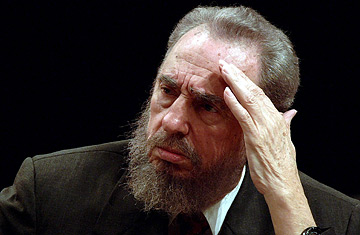
Does Castro's resignation mean real change?
"My desire was always to fulfill my responsibility until my last breath." With that, Fidel Castro suggested that he had wanted to hang on to power until the very end. But the central message of the letter published early Tuesday morning on the website of Granma, Cuba's official newspaper, was that poor health was forcing him formally to relinquish power. "To my close compatriots ... I say that I will not aspire to nor accept — I repeat, I will not aspire to nor accept — the office of President of the Council of State or Commander in Chief," he wrote. His resignation, coming just days before Cuba's National Assembly is to vote for a new leader, brings an end to nearly fifty years of rule.
"If he had presented himself for reelection, there is no doubt he would have won," says Carlos Malamud, head Latin American researcher at the Royal Elcano Institute, a Madrid think tank. "The fact that he didn't means, first, that his health is very bad, and second, that he needs to reinforce the legitimacy of his brother."
But does the resignation mean real change? After falling seriously ill with gastrointestinal disease nearly 19 months ago, Fidel, 81, temporarily handed power to his 76-year-old brother Raúl, who is now widely expected to be named President of the Council of State when the National Assembly votes on February 24. With his close ties to the Cuban military, Raúl has thus far proved a stable ruler; little detectable reform has occurred under his watch. That consistency owes at least a partial debt to the control that Fidel has continued to exercise, even from his sickbed.
"Raúl has proposed changes, but nothing's been done. Fidel is always there, monitoring him, tutoring him," says Luís Manuel García, editor of Encuentros, a Madrid-based magazine focused on Cuban affairs. "He's acted as a counterweight to his brother." Malamud expects that even now, that role will not change. "Fidel will continue to be the guardian of orthodoxy. He'll continue to block any change."
Although experts like García see Raúl as more naturally open, a lot will hang, then, on how long Fidel survives. "On his own, I think he would want to make some timid economic reforms, some timid steps toward openness," says García. "Raúl has a greater awareness that there's paralysis in Cuban society today, a dangerous sense of immobility."
But at least one person who knows the two brothers personally doubts that, even with Fidel gone, Raúl will initiate change. Idámis Menéndez, Fidel's former daughter-in-law who has lived in Barcelona since 2001 and is no longer permitted to return to Cuba, says, " Raúl thinks very differently than Fidel. But he's lived his whole life in his brother's shadow, and the ministers and everyone else in the government are still the same. Raúl's not going to do anything now that would jeopardize his own interests."
